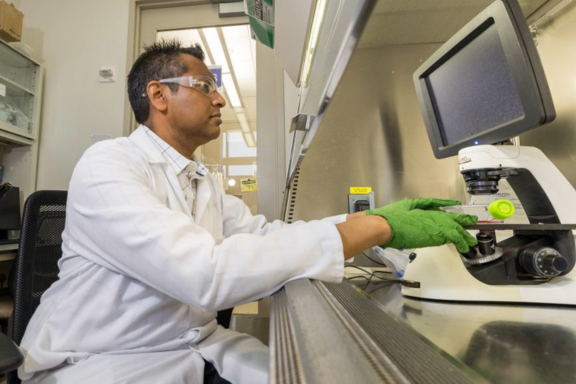Badger Talks Quick Picks
Does Growing up on the Farm Protect Children from Allergies?

This is an accordion element with a series of buttons that open and close related content panels.
Talk description
Allergies are increasing at high rates across many parts of the world and continue to be one of the leading causes of hospitalization and school absences for children. There are no cures for allergies which can be managed with medications and lifestyle changes. Allergies typically start in early life and studies around the world strongly suggest that environmental exposures can impact the risk for developing allergies. One protective environment is animal farms. This talk will describe our ongoing study to identify the health benefits of growing up on a dairy farm and outline potential future work to provide early life prevention strategies to all children at risk for developing allergies.
About the speaker
Christine Seroogy is a Professor in the Department of Pediatrics and the E. Richard Stiehm Endowed Chair in Pediatric Allergy, Immunology and Rheumatology. Christine grew up in Green Bay and received a BS in Microbiology from UW–Madison. She completed her medical education at the University of Minnesota, UC San Diego, Harvard Medical School, UC San Francisco and Stanford. She joined the faculty at UW–Madison in 2003. She cares for children with immune deficiencies and her research is focused on understanding how environments shape the immune system.
The Positive Path Through Madison's Darbo Neighborhood
Photo from Madison365: https://madison365.com/250000-grant-from-wisconsin-partnership-program-will-give-a-boost-to-youth-at-mentoring-positives/

This is an accordion element with a series of buttons that open and close related content panels.
Talk description
Mentoring Positives is a program open to K-12 students in Madison’s Darbo neighborhood. The program promotes positive youth health and well-being by focusing on building trusting relationships, introducing social-emotional learning and developing life skills through mentoring, athletics and social entrepreneurship… it includes a youth entrepreneurial program that produces Off the Block pizzas and salsas.
About the speakers
Will Green, Mentoring Positives Executive Director
Tonya Mathison, Wisconsin Partnership Program Administrative Director
Badger Talks Podcast
The Microscopic World Around Us

This is an accordion element with a series of buttons that open and close related content panels.
Podcast description
Explore the microscopic world within us. Learn how friendly commensal bacteria support our health and how rogue pathogens cause harm. Discover the fascinating balance between these unseen microorganisms and how scientists study them.
About the speaker
Dr. Suzana Salcedo is an Associate Professor at the University of Wisconsin-Madison’s School of Veterinary Medicine. Trained as a microbiologist in Porto, Portugal, she earned her doctorate from Imperial College London (UK). After postdoctoral training and some years as a staff scientist in Marseille, France, she established her independent research group in Lyon before relocating to the U.S. Her research focuses on how bacteria evade the immune system and persist inside host cells to cause disease. Dr. Salcedo’s team studies important human and veterinary pathogens, including Brucella, a leading cause of zoonotic infections worldwide, and Acinetobacter baumannii, a multi-drug-resistant nosocomial threat. By uncovering the mechanisms of bacterial infection and the host responses, her group aims to help develop new strategies to combat these pathogens.
Editing Genomes for Better Eyesight

This is an accordion element with a series of buttons that open and close related content panels.
Podcast description
Explore the fascinating world of genome editing and the power of CRISPR technology in correcting genetic ‘misspellings’ that lead to blindness and other inherited diseases. This groundbreaking advancement is helping shape the future of gene therapy.
About the speaker
Dr. Krishanu Saha, professor of biomedical engineering at the Wisconsin Institute for Discovery, develops precision genome editing and cell therapies. He is also trained in chemical engineering. The object of his laboratory research has been to utilize human stem cells to engineer novel cell and gene therapies. Examples include fixing inherited mutations within patient-derived, pluripotent stem cells and creating more precise tools to write the genome with CRISPR-Cas9 technology. His lab now leads several efforts in using stem cell technologies to discover and develop new genome surgery strategies (within the NSF Center for Cell Manufacturing Technologies (CMaT) and NIH Somatic Cell Genome Editing (SCGE) Initiative). With clinical partners he is building translational teams that are moving towards first-in-human trials for new gene therapy products targeting the retinal pigmented epithelium and photoreceptors in the outer retina.
